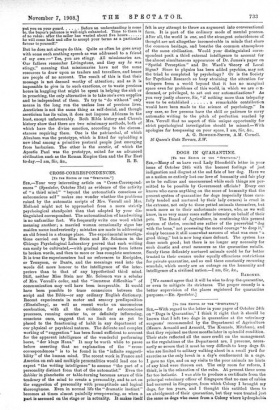CROSS-CORRESPONDENCES.
[TO THY EDITOR OF THE "SPECTATOR:']
SIR,—Yottr very interesting article on " Cross-Correspond- ences " (Spectator, October 31st) as evidence of the activity of " a third mind" " beyond the automatist's conscious or subconscious self" makes one wonder whether the problems raised by the automatic scripts of Mrs. Yerrall and Mrs. Holland might not be approached from a more strictly psychological standpoint than that adopted by your dis- tinguished correspondent. The automatisation of handwriting is no unfamiliar fact. We frequently write one word whilst meaning another ; a married woman occasionally signs her maiden name inadvertently ; mistakes are made in addressing an old friend in a strange place. The experimental investiga- tions carried out by Miss Stein and Mr. Solomon in the Chicago Psychological Laboratory proved that such writing can easily be cultivated,—with gradual progress from letters to broken words, and then to more or less complete sentences. It is true the experimenters had no references to Euripides, or Tennyson, or Dante, and the meanings read into the words did more honour to the intelligence of the inter- preters than to that of any hypothetical third mind. Still, neither Miss Stein nor Mr. Solomon was a scholar of Mrs. Verrall's order, and the "immense difficulties " of communication may well have been insuperable. It would have been possible to trace connexions between the script and the Bible—or any ordinary English dictionary. Recent experiments in motor and sensory predisposition (Einstellung), as well as recent works on unconscious cerebration, with all the evidence for subconscious processes, running counter to, or definitely influencing, conscious ones, suggest that no limit can as yet be placed to the functioning of habit in any department of our physical or psychical natures. The delicate and complex working of " suggestion" has been found sufficient to account for the apparent intelligence of the wonderful performing horse, " der kluge Hans." It may be worth while to pause before asserting that no explanation of the " cross- correspondences" is to be found in the "infinite suggesti- bility " of the human mind. The recent work in France and America on sub and multiple personalities would lead one to expect " the writing intelligence" to assume " the part of a personality distinct from that of the automatist." Even the dabbler in planchette or table-turning becomes aware of this tendency of the mind to create a personality, and to act on the suggestion of personality with promptitude and logical thoroughness. Even in normal life the " dramatic instinct" becomes at times almost painfully overpowering, as when a part is assumed on the stage or in actuality. It makes itself
felt in any attempt to throw an argument into conversational form. It is part of the ordinary mode of mental process. After all, the world is one, and the strangest coincidences of thought are not altogether inconceivable in minds that share the common heritage, and breathe the common atmosphere of the same civilisation. Would your distinguished corre- spondent posit a third external intelligence to account for the almost simultaneous appearance of Dr. James's paper on " Spatial Perception " and Dr. Ward's 'theory of Local Signs P Since to physics has been added psychics, may not the triad be completed by psychology ? Or is the Society for Psychical Research so busy straining the attention for whispers from a world beyond that it has no marginal space even for problems of this world, in which we are un- demned, or privileged, to act out our automatisations P As you very justly observe, Sir, "if nothing more than telepathy
were to be established a remarkable contribution would have been made to the science of psychology." In any case, so few persons have the skill or patience to carry automatic writing to the pitch of perfection reached by Mrs. Verrall that no aspect of this unique opportunity for strict psychological investigation should be missed.—With apologies for trespassing on your space, I am, Sir, &c., A. G. BownEx-SMITH, A.M. Cornell. 16 Queen's Gate Terrace, S.W.




























































 Previous page
Previous page